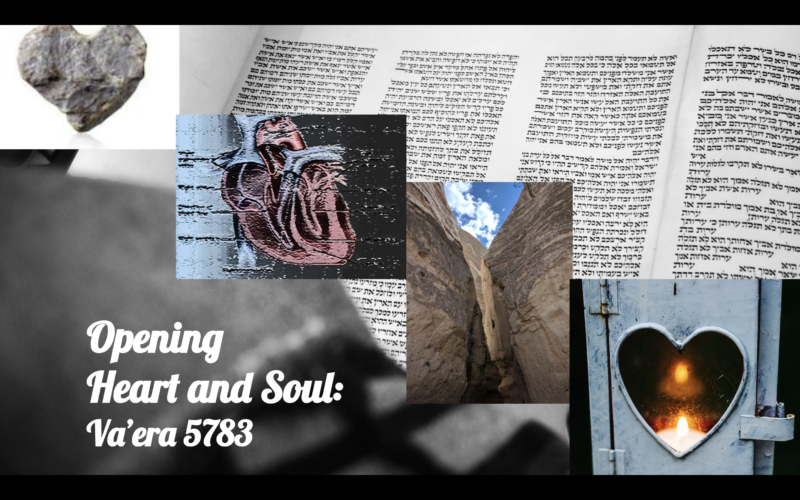Opening Heart and Soul: Vaera 5783
Early in this week’s Torah portion, Va’era, God makes four promises to us: I will free you from the labors of the Egyptians; I will redeem you with an outstretched arm; I will take you to be My people and I will be your God; and I will bring you into the land of promise. (From Exodus 6:6-8)
The Four Cups we bless and drink at our Passover seders represent these promises of freedom, redemption, covenant, and that “land” of promise and becoming. “But when Moses told this to the Israelites, they would not listen to Moses, their spirits crushed by cruel bondage.” (Ex. 6:9)
The children of Israel can’t hear what he’s saying, because their spirits have been crushed. קֹּ֣צֶר ר֔וּחַ / Kotzer ruah: spiritual shortness of breath, constriction of soul. They’ve been mistreated for so long they can no longer imagine anything better than Mitzrayim (Egypt) and meitzarim (tight straits).
Then come the first several plagues. Before the first plague we read, “וַיֶּחֱזַק֙ לֵ֣ב פַּרְעֹ֔ה / v’y’hazek lev Par’o, Yet Pharaoh’s heart stiffened.” And then, repeatedly, “וַיַּכְבֵּ֤ד פַּרְעֹה֙ אֶת־לִבּ֔וֹ / v’y’khabed Par’o et-libo, And Pharaoh hardened his heart.” Rashi renders it as “he allowed his heart to become hardened.”
Only after Pharaoh has hardened his heart six times does Torah say that “God hardened his heart.” I think of this almost like karma. Pharaoh makes his choices, repeatedly, and in time he becomes what he has chosen. It’s not a lightning bolt from on high; God just lets him continue the groove he’s carved.
Spiritual shortness of breath; spiritual calcification of the heart. We could call those anxiety — and indifference. Or grief — and callousness. Or depression — and cruelty. Or fear — and power. These ways of being are not something from our ancient spiritual past. They’re part of the human condition.
Maybe we’ve felt stuck in an unbearable place, unable to imagine better, unable even to conceptualize that we deserve better than this. Maybe we’ve been crushed by depression and its nihilistic whisper that nothing is ever better than this anyway so it’s not worth trying. I’d call those kotzer ruah.
And maybe we’ve hardened our hearts. Though I want to unpack that a little. It can mean turning away from suffering, ignoring our obligations to the most vulnerable. And we’ve all done that, and we can all do better. And… I’m also aware that hardening the heart can be a necessary defense mechanism.
Sometimes we couldn’t function if we opened our hearts to all of the suffering in our world. Sometimes we have to shield or encase the heart in a kind of spiritual armor to be safe. I think that might be where Pharaoh started. And my support for that theory is the verb that Torah uses here.
“וַיֶּחֱזַק֙ לֵ֣ב פַּרְעֹ֔ה / v’y’hazek lev Par’o, Yet Pharaoh’s heart stiffened[.]” That verb is the same one we find in Psalm 27: חֲ֭זַק וְיַאֲמֵ֣ץ לִבֶּ֑ךָ / Hazak v’ya’amatz libecha! “Be strong and strengthen your heart,” or as we sing it during the Days of Awe, “Be strong and open up your heart wide!”
Strengthening our hearts can be good and holy and necessary. And Torah also teaches us to cut away the calcified layer of armor that can build up around the heart. “[Cut away] the foreskin of your heart” (Deut. 10:16 — here are some beautiful teachings on that.) Healthy spiritual life asks both of these.
“Be strong and open up your heart wide” — because it takes strength to have heart, to be open-hearted. We need gevurah, power and strength and boundaries, and hesed, openhearted flowing love. In other words, we need the balance of the two — tiferet, our high holiday theme for 5783.
Hardening our hearts is something different. If we repeatedly harden our hearts, as Pharaoh did, after a whie we’re not talking about a protective shell that can be opened. A persistent pattern of choosing hardness of heart will eventually turn the heart to stone. It’s up to us to feel the difference.
It strikes me that both of these ask us to open up. Open the heart — safely, appropriately, but find ways to not be wholly closed-off. And as for our spirit, maybe it’s like in Psalm 118: “From the straits I called to You; answer me with Your expansiveness!” We cry out; God opens us up.
If you’re living with kotzer ruah, spiritual shortness of breath or a constricted heart, I can promise you that life will not always be this. And if you can’t believe that, I’ll hold it for you until you can feel it. Change will come, as certain as Tu BiShvat heralds the inner growth of a new spiritual spring.
And if you’re living with a protective shell around your heart: may you find safety to open that protective covering and let emotions out and in. Be strong and open your heart wide. That’s renewed tiferet. That’s how we reach God’s promises of freedom and covenant and growth in days to come.
This is the d’varling that Rabbi Rachel offered this Shabbat (cross-posted to Velveteen Rabbi.)






